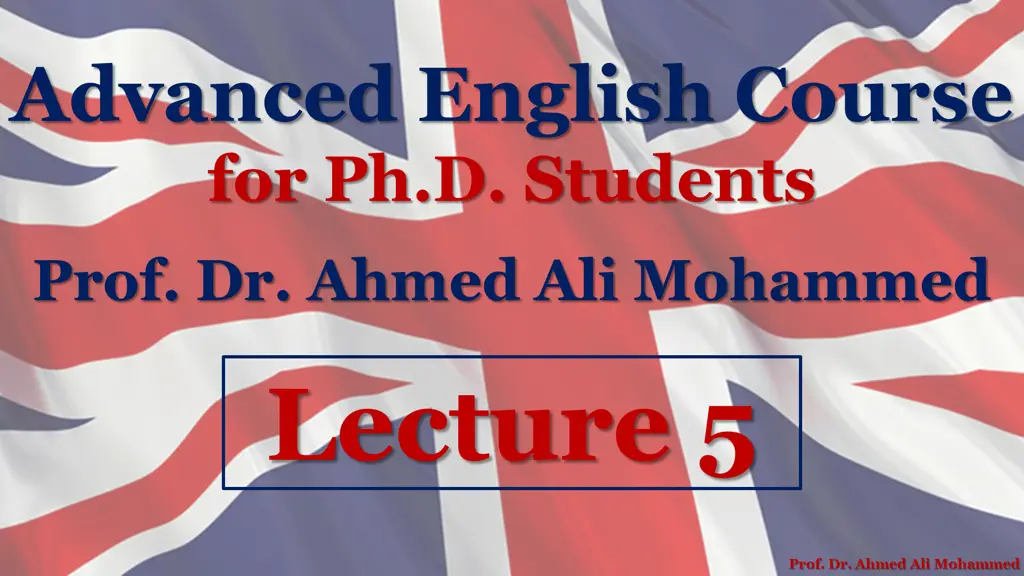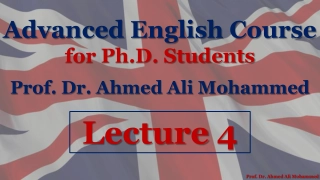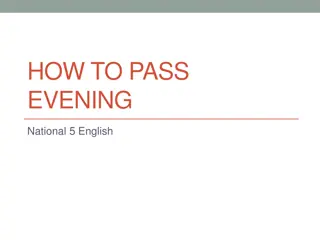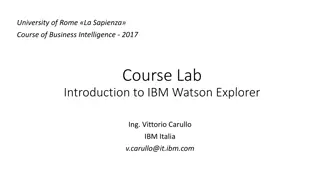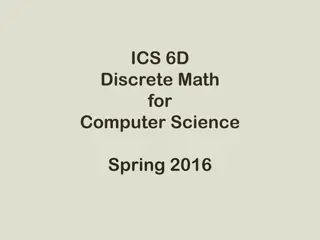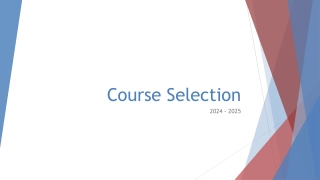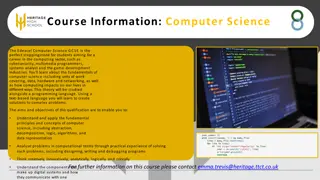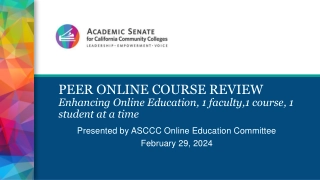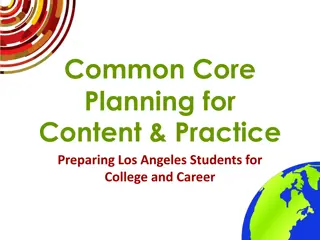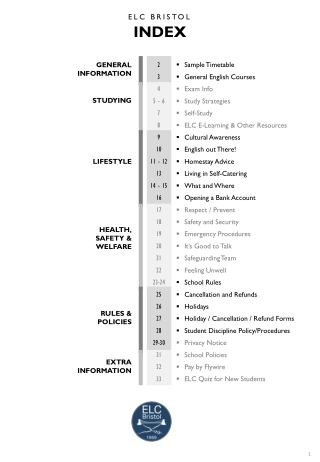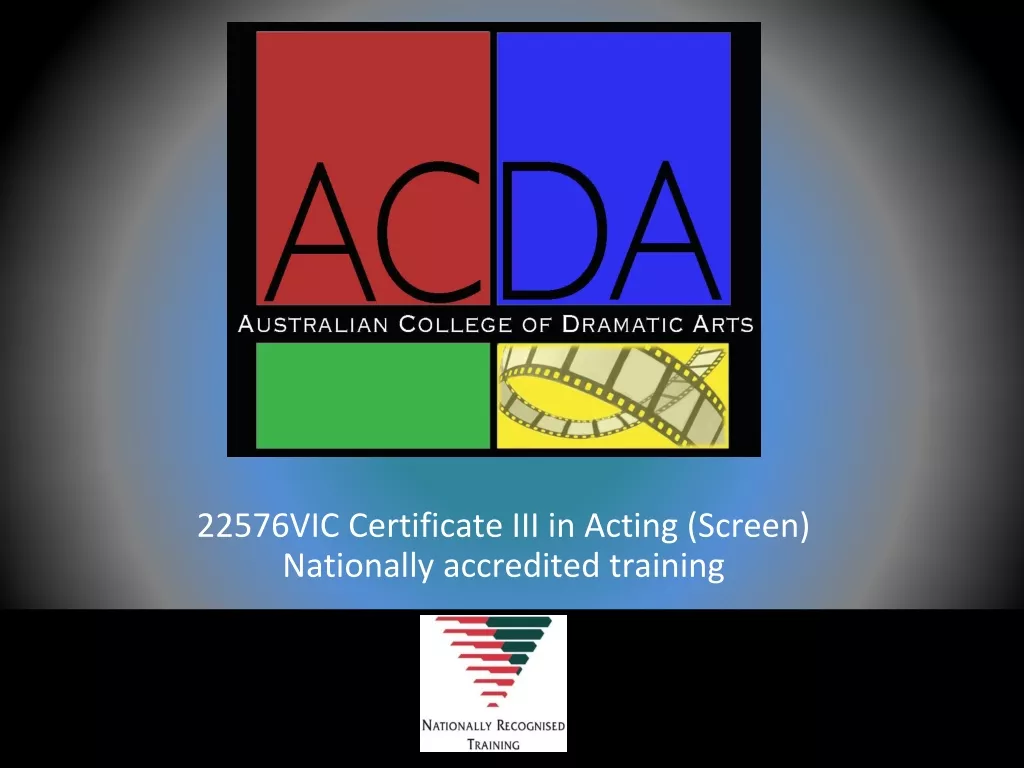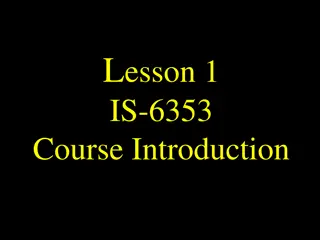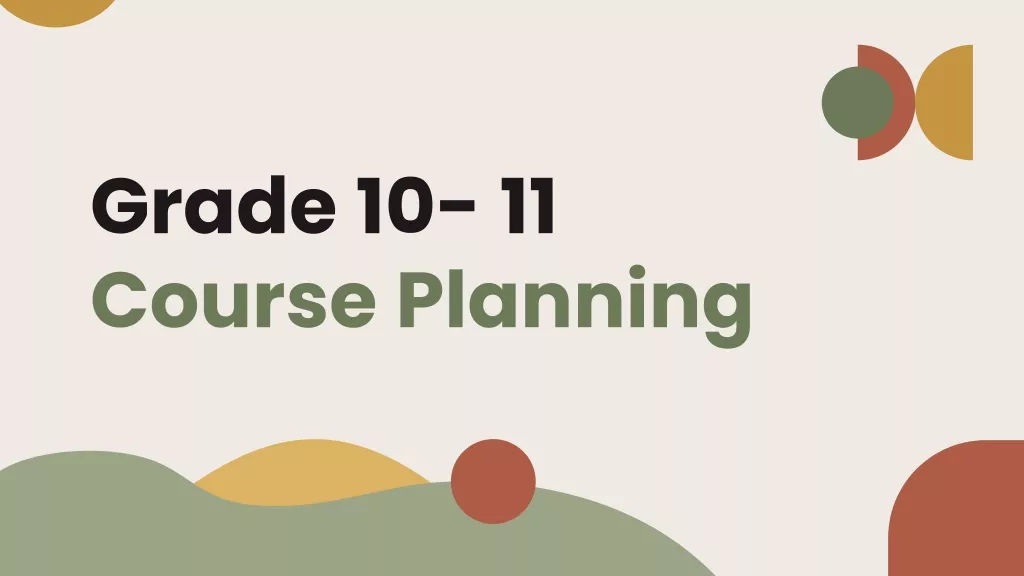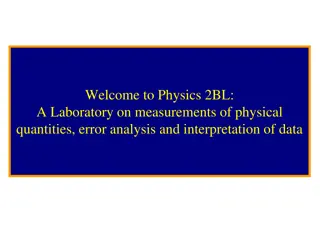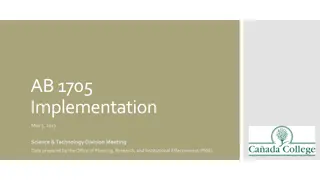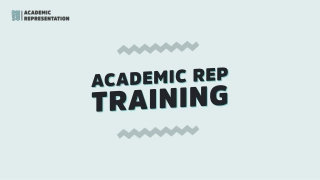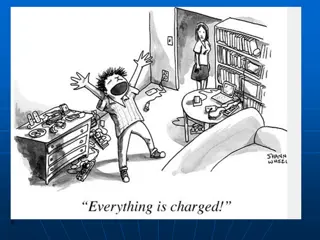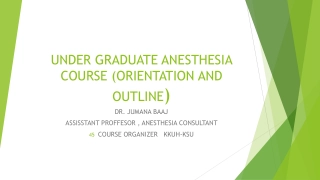Advanced English Course for Ph.D. Students
Prof. Dr. Ahmed Ali Mohammed's lecture on paraphrasing and quoting in academic writing. Learn strategies to develop paraphrasing skills and understand the purpose of paraphrasing in research.
Download Presentation
Please find below an Image/Link to download the presentation.
The content on the website is provided AS IS for your information and personal use only. It may not be sold, licensed, or shared on other websites without obtaining consent from the author. Download presentation by click this link. If you encounter any issues during the download, it is possible that the publisher has removed the file from their server.
Presentation Transcript
Advanced English Course for Ph.D. Students Prof. Dr. Ahmed Ali Mohammed Lecture 5 Prof. Dr. Ahmed Ali Mohammed
Lecture 5 Prof. Dr. Ahmed Ali Mohammed
What is paraphrasing? It is expressing the meaning of something written or spoken using different words, especially to achieve greater clarity. Paraphrasing is presenting ideas and information in your own words and acknowledging where they come from using your own words; you demonstrate your understanding and your ability to convey this information. Presenting the ideas and information you have read in your own words is an important academic skill. By translating content from your research into your own words, you demonstrate to your reader that you've understood and are able to convey this content. Prof. Dr. Ahmed Ali Mohammed
How do I paraphrase? There are useful strategies to develop your paraphrasing skills. The most important feature, however, is to make sure you understand the text fully before you attempt to paraphrase it. 1. Read the original text you want to paraphrase carefully until you understand it before you attempt to paraphrase it. 2. Look up in your dictionary any words you do not understand. 3. Note down key concepts. (optional) 4. Re-read the text quickly, skim it if you feel confident. In particular, pay attention to first sentences in paragraphs (these are often the topic sentences) and key words. 5. Cover the text and verbally summarise it, from memory only. It is not necessary to use complex academic language; use your own words. 6. Write down your version of the text without looking at the original. Prof. Dr. Ahmed Ali Mohammed
7. Check the original text again to make sure you have included the main points. Add quote marks if you have used any key phrases or unique terms which cannot be paraphrased. 8. Compare your paraphrased text and make adjustments to ensure that it does not remain too similar. Edit your work so it is written in an academic manner and it flows with the rest of your assignment. 9. Make sure you have included a citation. Record all source and author details for future reference. What is the purpose of paraphrasing? Paraphrasing is a highly acceptable way to include the ideas of other people in your writing. It is very important, however, to paraphrase correctly because there is a fine balance between acceptable paraphrasing and unacceptable paraphrasing (plagiarism). Prof. Dr. Ahmed Ali Mohammed
To summarize or simplify the author's ideas, making them easier to understand and more approachable. It is to putting a text or ideas into your own words in a formal term. Four tips for paraphrasing 1. Start your first sentence at a different point from the original source. 2. Use as many synonyms as possible. 3. Change the sentence structure 4. Break the information into separate sentences. What is quoting? Quoting (or quotation) is when you take a phrase, sentence or passage straight from a reading and incorporate it into your own writing. You must always provide a reference when you quote another source directly, and certain punctuation must be used to show where the quote begins and ends. For example, Short quotes (i.e. less than 30 words long) must have inverted commas ('...') around them. Prof. Dr. Ahmed Ali Mohammed
Avoiding plagiarism through quoting and paraphrasing Before quoting, It's important to follow the conventions of your discipline, as many disciplines like the sciences have little use for quotes in academic work, while others like the Humanities frequently use quotes. Do not fall into the trap of over-quoting. Your reader is interested in reading your work and your voice, and if your assignment is comprised mainly of other people's voices this will not be looked upon positively. Anyone can quote other people, so it's important to demonstrate that you've also understood and can convey the information you read. In addition, you should only quote something if it's especially insightful, or is someone's own argument or commentary on a topic. Do not quote basic factual information. Prof. Dr. Ahmed Ali Mohammed
Paraphrasing vs. quoting Paraphrasing shows that you clearly understand the meaning of a text. Your own voice will remain dominant throughout your paper. Quotes reduce the readability of your text. Quotes are appropriate when: Giving a precise definition. Saying something about the author s language or style. Providing evidence in support of an argument. Critiquing or analyzing a specific claim. Why summarize? While paraphrasing and quoting are ideal if you wish to focus on one section of a research article, summarizing is a useful tool if you find the entire source relevant and interesting. Prof. Dr. Ahmed Ali Mohammed
Paraphrasing example Original passage The number of foreign and domestic tourists in the Netherlands rose above 42 million in 2017, an increase of 9% and the sharpest growth rate since 2006, the national statistics Wednesday (DutchNews.nl, 2018). office CBS reported on Paraphrased version According to the national statistics office, the Netherlands experienced dramatic growth in tourist numbers in 2017. More than 42 million tourists travelled to or within the Netherlands that year, representing a 9% increase the steepest in 12 years (DutchNews.nl, 2018). Prof. Dr. Ahmed Ali Mohammed
What is plagiarism? It is the process of taking other people's words and/or ideas and pretending that they are your own, with or without their consent, by incorporating it into your work without full acknowledgement. All published and unpublished material, whether in manuscript, printed or electronic form, is covered under this definition. The best way of avoiding plagiarism is to learn and employ the principles of good academic practice from the beginning of your university career. Avoiding plagiarism is not simply a matter of making sure your references are all correct, or changing enough words so the examiner will not notice your paraphrase; it is about deploying your academic skills to make your work as good as it can be. Prof. Dr. Ahmed Ali Mohammed
Why does plagiarism matter? Plagiarism is a breach of academic integrity (honesty). It is a principle of intellectual honesty that all members of the academic community should acknowledge their debt to the originators of the ideas, words, and data which form the basis for their own work. Passing off another s work as your own is not only poor scholarship, but also means that you have failed to complete the learning process. Plagiarism is unethical and can have serious consequences for your future career; it also undermines the standards of your institution and of the degrees it issues. How to avoid plagiarism? 1. Paraphrase: When you find information that is perfect for your research paper, read it and put it into your own words. Prof. Dr. Ahmed Ali Mohammed
2. Make sure that you do not copy more than two words in a row from the text you have found. If you do use more than two words together, you will have to use quotation marks. 3. Cite: Citing is one of the effective ways to avoid plagiarism. Follow the document formatting guidelines used by your educational institution or the institution that issued the research request. Citing is really that simple. Not citing properly can constitute plagiarism. 4. Quote: When quoting a source, use the quote exactly the way it appears. No one wants to be misquoted. Quoting must be done correctly to avoid plagiarism. 5. Citing Quotes: Citing a quote can be different than citing paraphrased material. Prof. Dr. Ahmed Ali Mohammed
6. Citing Your Own Material: If some of the material you are using for your research paper was used by you in your current class, a previous one, or anywhere else you must cite yourself. Treat the text the same as you would if someone else wrote it. Using material you have used before is called self-plagiarism, and it is not acceptable. 7. Referencing: One of the most important ways to avoid plagiarism is including a reference page at the end of your research paper. Again, this page must meet the document formatting guidelines used by your educational institution. This information is very specific and includes the author(s), date of publication, the title, the source (journal, book etc) and pages. Follow the directions for this page carefully. You will want to get the references right. Prof. Dr. Ahmed Ali Mohammed
ThankYouFor Your Listening Prof. Dr. Ahmed Ali Mohammed
See You Next Lecture Prof. Dr. Ahmed Ali Mohammed
